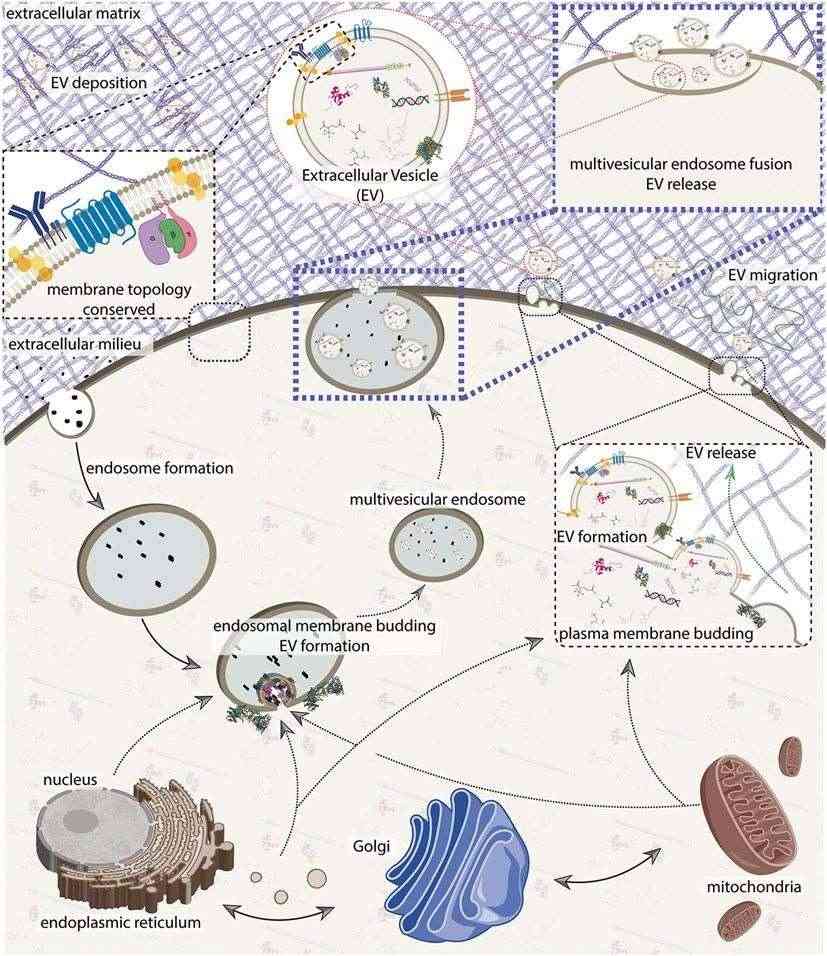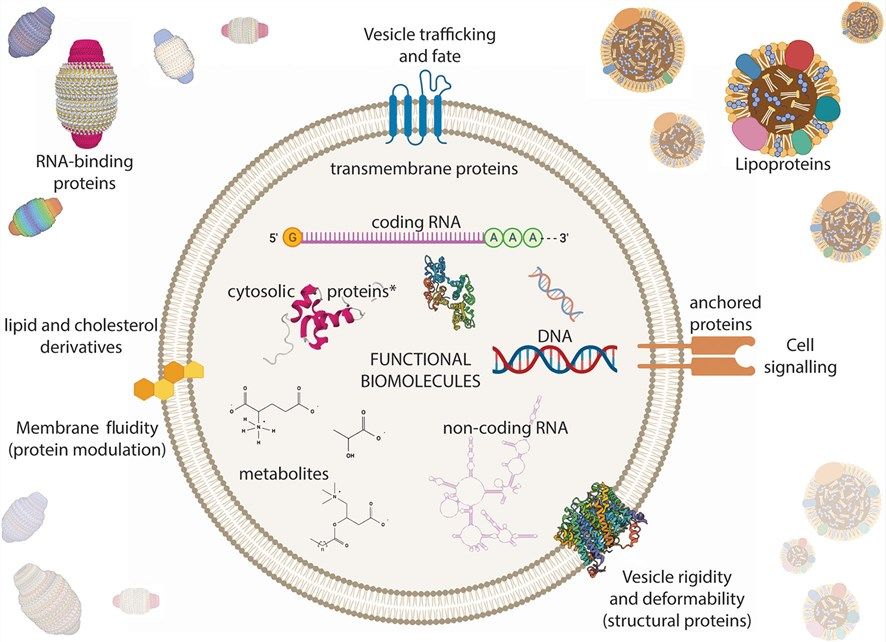Exosome - NGS Services (RNA Next Gengeration Sequencing)
Overview Services Features FAQs
To examine exosomal RNA, next-generation sequencing (NGS) has been introduced. With cutting-edge tools and knowledgeable professionals, Creative Biolabs has refined our technological platform to provide clients with RNA sequencing services that are both excellent and very efficient in helping expedite research.
 Fig.1 An integrative model of extracellular vesicle (EV) biogenesis.1
Fig.1 An integrative model of extracellular vesicle (EV) biogenesis.1
Overview
Exosomes contain RNAs (mRNA/microRNA) that can be transferred to and remain functional in receptor cells. More importantly, exosomal mRNA can be translated to proteins in receptor cells, and some exosomal miRNA can bind and regulate mRNAs of recipient cells. Furthermore, exosomes also contain DNA fragments, but their function has yet to be understood. Several studies have shown that the transferred RNA can regulate the processes of receptor cells, such as apoptosis and differentiation. These discoveries spark research interest in the field of exosomes as specific cellular messengers for nucleic acid-based cell-to-cell communication.
 Fig.2 Extracellular vesicle (EV) composition in the context of biological solutions.1
Fig.2 Extracellular vesicle (EV) composition in the context of biological solutions.1
Exosomal RNA contains not only mRNA and miRNA but also sRNA and piwi-interacting RNA (piRNA). In addition, exosomes display multiple miRNAs, qualitative and quantitative evaluation of their abundance in exosomes is significant, especially tumor-associated miRNAs. Recently, many researchers have quantified the miRNAs using RT-PCR and assessed their abundance in exosomes.
Services at Creative Biolabs
An emerging technique for scientists' transcriptome research is combining RNA-Seq with NGS. Rapid adaptability to diverse biomedical research domains has enabled high-throughput NGS to gradually tackle specific clinical applications. Actually, in certain healthcare contexts, NGS has already started to show results. In recent years, exosomal RNA has caught a lot of researchers' sight. NGS-based exosome analysis has become an important role in research. As a global leading CRO company, Creative Biolabs has equipped our platform with state-of-art technologies and seasoned experts. We provide a range of NGS-based exosome analysis services, such as precise sequencing and effective RNA microarray.
An extensive list of the services we offer for NGS-based exosome analysis, such as:
Features
-
Comprehensive RNA Profiling: Gain deep insights into exosomal RNA content with high-throughput sequencing technologies.
-
High Sensitivity: Detect low-abundance RNA species with exceptional sensitivity, crucial for biomarker discovery and characterization.
-
Quantitative Analysis: Accurately quantify RNA molecules to understand expression levels and regulatory mechanisms.
-
Bioinformatics Support: Access advanced bioinformatics tools for data analysis and interpretation, ensuring robust results.
-
Quality Assurance: Rigorous quality control measures to ensure data integrity and reliability.
-
Expert Consultation: Collaborate with experienced scientists and bioinformaticians for experimental design and result interpretation.
Creative Biolabs specializes in assisting with your exosomal research, please don't hesitate to contact us with your interest.
FAQs
Q: How does your Exosome - NGS Service work, and what types of sequencing can be performed?
A: Our service begins with exosome isolation, followed by RNA or DNA extraction and library preparation for NGS. We offer both RNA-seq and DNA-seq options, allowing comprehensive profiling of exosome cargo and elucidation of their molecular characteristics.
Q: Can Exosome - NGS accurately capture the diverse cargo of exosomes, including small RNAs and other biomolecules?
A: Yes, Exosome - NGS is capable of capturing a wide range of exosome cargo, including small RNAs (miRNA, piRNA), mRNAs, long non-coding RNAs (lncRNA), and genomic DNA fragments. This comprehensive profiling provides a holistic view of exosome content and function.
Q: How can researchers interpret and analyze the data generated from Exosome - NGS Services?
A: Data analysis from Exosome - NGS involves bioinformatics processing to identify and quantify exosome cargo molecules. Researchers can analyze differential expression, pathway enrichment, and network interactions to decipher the biological significance of exosome contents and their potential roles in health and disease.
Q: What are the advantages of utilizing Exosome - NGS Services for exosome research, and how can researchers leverage these benefits?
A: Exosome - NGS Services provide objective, high-throughput exosome cargo profiling, facilitating an in-depth investigation of the biology and function of exosomes. Our knowledge of exosome-mediated intercellular communication can be advanced, and the development of exosome-based diagnostics and treatments can be aided by the discovery of novel biomarkers, signaling pathways, and therapeutic targets.
Reference
-
Veziroglu, Eren M., and George I. Mias. "Characterizing extracellular vesicles and their diverse RNA contents." Frontiers in Genetics 11 (2020): 558262. Under Open Access license CC BY 4.0. The image was modified by revising the title.
For Research Use Only. Cannot be used by patients.
Related Services:

 Fig.1 An integrative model of extracellular vesicle (EV) biogenesis.1
Fig.1 An integrative model of extracellular vesicle (EV) biogenesis.1
 Fig.2 Extracellular vesicle (EV) composition in the context of biological solutions.1
Fig.2 Extracellular vesicle (EV) composition in the context of biological solutions.1









